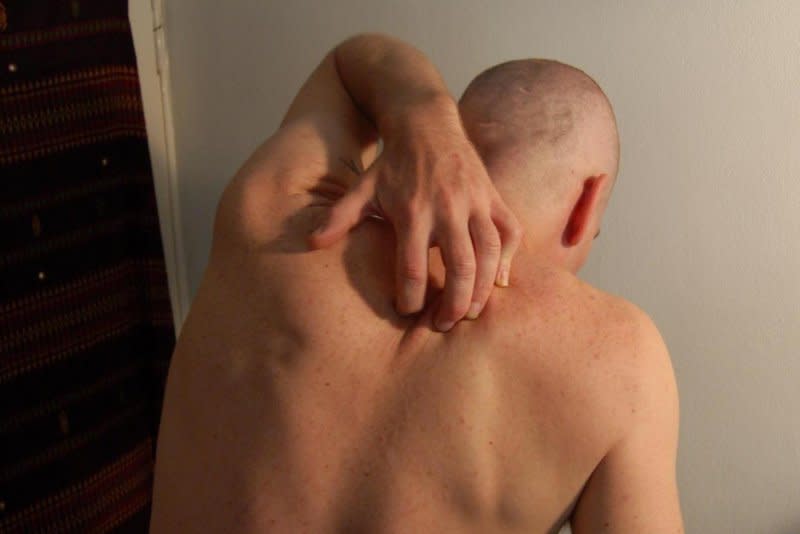Can't sleep? Your skin might be to blame, study says

NEW YORK, Oct. 12 (UPI) -- A new global study suggests that 42% of patients with skin disease suffer from sleep disturbances.
The findings were to be presented Friday at the European Academy of Dermatology and Venereology Congress in Berlin.
The findings were derived from a comprehensive, international research initiative, the ALL Project, which analyzed more than 50,000 adults across 20 countries on five continents to evaluate the impact of skin diseases.
The project revealed that these sleep disturbances have broader implications on patients' quality of life. Nearly half -- 49% -- of patients with skin disease reported decreased productivity at work, in contrast with only just one in five -- 19% -- participants without a skin disease.
The main symptoms that affected the sleep of patients with skin disease were itching at 60% and burning sensations or tingling at 17%.

In addition, patients with skin disease experienced a feeling of fatigue more often upon waking up (81% versus 64% in the non-skin disease population); periods of drowsiness during the day (83% versus 71%); tingling sensations in the eyes (58% versus 42%); and repeated yawning (72% versus 58%).
First of its kind

"Our study is the first to highlight the considerable impact of sleep disorders on the physical functioning of patients with skin disease," lead author Dr. Charles Taieb told UPI via email.
"They lead to a significant deterioration in quality of life. These results highlight the need for early detection and effective management of sleep disorders."

Taieb is the research director at European Market Maintenance Assessment in Paris, which arranged and managed the ALL Project for Pierre Fabre's Patient Centricity department. The department's idea was to study all types of skin, skin colors and skin conditions -- hence, the name ALL.
"In the future, healthcare providers should be encouraged to include questions about sleep disorders in the examinations of patients suffering from skin conditions, to promote a more comprehensive understanding of the impact of skin diseases," he said.

"The ALL project also aims to shed light on the impact of skin diseases and patients' experiences of them, so that we can mitigate these damaging effects and improve patients' quality of life."
Painful skin condition
This study also explored the impact of living with hidradenitis suppurativa -- a painful, long-term skin condition that causes skin abscesses and scarring that affects about 1 in 100 people.
The condition occurs near hair follicles where there are sweat glands, such as around the groin, bottom, breasts and armpits. The exact cause is unknown, and it is often difficult to control, although symptoms may improve or eventually stop with treatment.
Findings from the study indicated that 77% of patients with hidradenitis suppurativa reported a feeling of stigmatization due to their condition, with 58% experiencing ostracization or rejection from others.
More than half of patients noted that others avoided touching them (57%) and approaching them (54%) because of their condition.
These experiences resulted in major consequences for patients, affecting their self-perception, relationships and daily lives, the study indicated.
Patients who reported feelings of stigmatization were more likely to avoid taking selfies (52%), compared with those without the condition (84%), and tended to manage their appearance whenever they encountered a mirror (72% versus 34%).
Nearly 79% of patients who showed poor adherence to therapy also reported a feeling of stigma.
See impact daily
Dr. Naina Rengarajan, who was not involved in the study, told UPI via email that it is one of the largest to evaluate the association between skin disease and sleep disturbances.
Rengarajan is a dermatologist and physician-scientist at Washington University School of Medicine in St. Louis.
"As dermatologists, we see daily how much skin diseases affect our patient's quality of life. These burdens are sometimes under-appreciated by public health organizations and funding resources," she said.
"This kind of epidemiological data from the ALL Project is crucial to draw attention to the emotional, social and eventually financial burden that skin disorders pose. It's key for researchers to advocate for more funding to study skin diseases that have such a significant impact on our patients' day-to-day lives."
Sleep disturbances are surprisingly common in patients with skin disease, Rengarajan said.
"A majority of the common skin disorders cause either skin pain, itch or sometimes an odor that affects a patient's ability to rest," she said. "The emotional and psychological consequences of disorders that are visible to people around us also lead to insecurity and shame, which will undoubtedly affect sleep."
All skin conditions eyed
Dr. Erin Barrett, also not involved in the study, told UPI via email that while sleep disturbances have been investigated in selected skin diseases -- including eczema, hives, generalized itching disorders of the skin and some inflammatory conditions -- this study is unique in its assessment of sleep across all skin conditions.
Barrett is an associate professor in the department of dermatology at University of Nebraska Medical Center in Omaha, where she is the director of clinical trials in dermatology and inpatient dermatology services.
Her practice primarily focuses on treating inflammatory skin diseases, specifically autoimmune blistering diseases.
"Almost all of my patients have sleep disturbances either due to itching, pain or a medication side effect, such as from prednisone," she said. "However, there are few studies specifically looking sleep disturbances and how to best measure it in dermatology patients. Practitioners also do not routinely ask about sleep disturbances in these patients."
There are also few validated sleep quality questionnaires specifically designed for skin issues, so more research is needed in this area, Barrett said.
"Healthcare providers should be educated on inquiring about sleep disturbances in our patients, as sleep helps the body heal and has tremendous impact on our activities of daily living and emotional/psychological well-being," she said.
Added Dr. Justin Ko, director and chief of medical dermatology for Stanford Health Care in Palo Alto, Calif.: "When we provide patients with expert dermatologic care, the benefits can be profound and life-changing.
"Studies like this are creating the visibility around the often-hidden burden of skin diseases and provide the space for clinicians to ask about and for patients to talk about these issues."

